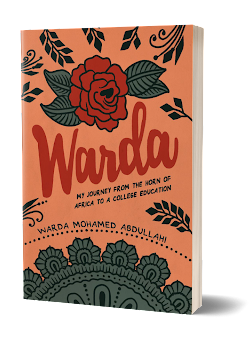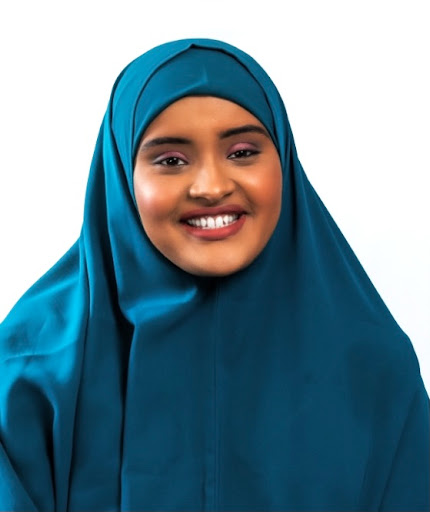 MINNEAPOLIS, Minnesota – In her powerful memoir, “Warda: My Journey from the Horn of Africa to a College Education,” Somali-American writer Warda Mohamed Abdullahi not only tells the story of her own resilience but also that of striving refugees around the world.
MINNEAPOLIS, Minnesota – In her powerful memoir, “Warda: My Journey from the Horn of Africa to a College Education,” Somali-American writer Warda Mohamed Abdullahi not only tells the story of her own resilience but also that of striving refugees around the world.
Set in the rugged shrublands of rural Ethiopia, the contentious neighborhoods of South Africa, and the icy streets of Michigan, Warda is the story of a fierce young woman on a tireless quest to become the first member of her family to go to college.
Born in Saudi Arabia to undocumented, ethnic Somali parents living hundreds of miles from their ancestral homeland, Warda Mohamed Abdullahi loses her mother in a horrific accident as a baby and must live apart from her father until she’s eleven years old. As she grows up, she faces tragedy and triumph, from staring down a wild leopard to protect her family’s sheep and goats, to carefully crossing borders and evading immigration officials across Africa, and traveling with her family to America to begin life anew.
Warda is a powerful memoir that will help readers understand the inequities and injustices embedded in a global system that determines who is allowed to move freely and live where they choose. It is the story of a father’s relentless quest to give his eldest daughter the opportunities he never had and a daughter’s perseverance, determination, and steadfast refusal to let go of a dream.
“Warda: My Journey from the Horn of Africa to a College Education”
Warda Mohamed Abdullahi | December 15, 2020 | Beaver’s Pond Press |
Memoir / Nonfiction
Paperback | ISBN: 643439197 | $17.95
E-book | $9.99
About the Author
 Warda Mohamed Abdullahi currently resides in Brooklyn Park, Minnesota, with her hooyo and aabo. She recently graduated from Saint Catherine University and is taking a year off to be with her family, including her daughter Rahma Abu Bakar Ibrahim. Warda looks forward to continuing her journey towards her doctorate in medicine, her lifelong learning in Islam, and spending time with her family. Find out more about her at wardaabdullahi.com.
Warda Mohamed Abdullahi currently resides in Brooklyn Park, Minnesota, with her hooyo and aabo. She recently graduated from Saint Catherine University and is taking a year off to be with her family, including her daughter Rahma Abu Bakar Ibrahim. Warda looks forward to continuing her journey towards her doctorate in medicine, her lifelong learning in Islam, and spending time with her family. Find out more about her at wardaabdullahi.com.
Follow Warda Mohamed Abdullahi on social media:
Twitter: @WardaAbdullahi3 | Instagram: @warda_abdullahi | TikTok: @Wardanuurah
LinkedIn: Warda Abduallahi | Facebook: Warda Mohammed Abdullahi
Clubhouse: Warda.abdullahi
In an interview, Warda Mohamed Abdullahi can discuss:
- Her early experiences born the daughter of undocumented, ethnic Somali parents, losing her mother and living apart from her father, and eventually finding refuge in the United States
- Her experiences as a refugee from Africa and the unique struggles faced by refugees
- The inequities and injustices faced by refugees, determining who moves freely and where they can live
- Her unwavering determination to pursue education in the United States as a refugee, plus her first impressions of school in America and her future goals
- World Refugee Day on June 20, 2022
An Interview with Warda Mohamed Abdullahi
Before we dive into everything else, would you please introduce yourself and tell us a little about your background?
My name is Warda Abdullahi, and I was born in Saudi Arabia. I have lived in many different places throughout Africa, where I faced many obstacles, such as loss of education, living through a drought, and losing my mother. But after everything, I still succeeded. I live in Minnesota now. I graduated from Saint Catherine University with a bachelor’s degree in Public Health while I wrote the book, “Warda.”
Why was it so important to you to be the first member of your family to go to college? What did that represent to you?
It represented change, a look into a better life and ditching our former nomadic pastoral lives. The Somalis have this saying which directly translates to “the last camel’s following the first,” so I wanted to be the first to create a chain reaction of success.
What was your first impression of school in America?
On my first day of high school in America, the school was big, and there were so many students, unlike in South Africa. Schools there are smaller, and there are not many students. I was confused. I had never seen students talk back to their teachers. It was certainly a first for me. Back home, we were taught that teachers are our second parents and should always respect them. Treat them as our parents. I could not stop thinking about how this student was not taking advantage of their opportunities around the world; kids their age pray to have an education every day. However, it has alway have been a dream of mine to have access to the best education in the world and despite everything I have been through, it was a fresh start for me where I could pursue my goals and dreams.
Has your relationship with academia been what you thought it would be? We see you have plans to pursue another degree…
Since I was 6, I have always wanted to become a family medicine doctor or a pediatrician. I will continue to pursue that dream, and any additional skills I may acquire will help toward that.
Your mentor, Mackenzie Wellman, wrote a beautiful afterword for your book. How did you two meet, and how did your relationship with her shape your life?
We met through a mentorship program during my junior year of high school at Ottawa Hills High School. Through the years of mentoring me, Mackenzie Wellmen became a family to me. She often comes down to Minnesota and hangs out with my family. She is the kindest and most caring human I have ever met. I am honored to have Mackenzie as my mentor as a first-generation student; she was a godsend as she guided me through applying to scholarships and different universities.
Obviously your story is one of resilience, but it is also one of hardships and self doubt – what kept you moving forward?
My father was my biggest supporter and motivator. He encouraged me to never give up on my education. He always reminds me of how he didn’t get the chance to go college and how all his hopes and dreams had been taken away.
I grew up in a place where every child’s dream was to have an education but was not available or affordable. Because of this, I made it a point to take advantage of the opportunities around me.
You identify as Somali-American, but you’ve lived all over (rural Ethiopia, South Africa, Saudi Arabia, Michigan and now Minnesota ). Do you feel connections to all of these cultures? How so?
Yes, I do feel connected to all these countries I have been to. Even though I was born in Saudi Arabia, I was raised in Ethiopia and this is the country that I am most connected to because I grew up and where most of my family is from. South Africa is the country where my journey to education started and I met my father after 10 years.
Can you discuss some of the unique struggles faced by refugees? You’ve mentioned the importance of highlighting the inequities and injustices that determine who moves freely and where they can live.
Some of the inequities and injustices refugees face are no access to food and water, also education. Throughout my life, refugees have been facing inequalities and no opportunities of education and I believe unless we do something about it, it will not change.
What’s next for you?
My future goal is to go to medical school to become a family medicine doctor and to raise my kids.

A former award-winning journalist with national exposure, Marissa now oversees the day-to-day operation of the Books Forward author branding and book marketing firm, along with our indie publishing support sister company Books Fluent.
Born and bred in Louisiana, currently living in New Orleans, she has lived and developed a strong base for our company and authors in Chicago and Nashville. Her journalism work has appeared in USA Today, National Geographic and other major publications. She is now interviewed by media on best practices for book marketing.

